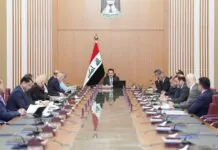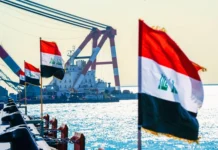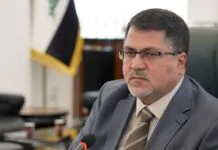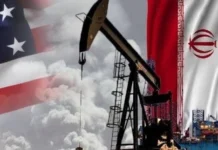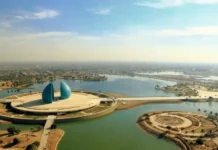Tishwash: Oil expert: Closing the Strait of Hormuz is currently unlikely… and why?
Oil expert Hamza Al Jawahiri ruled out the possibility of closing the Strait of Hormuz at the present time, unless the United States intervenes directly in any military conflict.
Al-Jawahiri told Al-Furat News Agency, “Closing the strait is not in the interest of Iran and the Gulf states if America does not intervene directly.”
He added, “All countries will be harmed by closing the strait, and the damage will be great for Iraq in particular, given its heavy dependence on oil revenues.
” Al-Jawahiri pointed out that “even if the strait is closed, it will only last for a few hours or days, as it is considered a vital artery that transports 30% of crude oil heading to global markets.” link
Tishwash: Following threats from Iraqi factions, the Pentagon told Shafaq News: We are strengthening our capabilities while maintaining a “defensive posture.”
The US Department of Defense confirmed, in an official response to Shafaq News Agency inquiries, that it has sent additional military capabilities to the Middle East. This comes at a time of escalating tensions over the ongoing conflict between Israel and Iran, and amid public threats from Iraqi armed groups loyal to Tehran to target US interests if Washington intervenes on Tel Aviv’s behalf.
A Pentagon spokesperson told Shafaq News Agency that the official position issued by US Secretary of Defense Pete Hegseth is to enhance the capabilities of the US Central Command (USCENTCOM), without revealing the nature of those capabilities or their locations.

In a separate post, Department of Defense spokesman Sean Parnell explained that “US forces remain in a defensive posture,” indicating that Washington is not seeking direct military escalation at this time.
The ministry declined to disclose whether it had engaged directly with the Iraqi government to contain threats posed by armed factions, or the nature of the expected response if US facilities or forces were attacked inside Iraq, referring only to the public statements of senior Pentagon officials.
Prominent Iraqi factions, such as Kata’ib Hezbollah and Harakat al-Nujaba, have escalated their warning tone, declaring their readiness to target US sites in Iraq and Syria if the United States intervenes militarily against Iran in the ongoing escalation.
The approximately 2,500 US troops deployed in Iraq are deployed as part of a training and support mission for Iraqi forces and the international coalition against ISIS. However, these forces have been the frequent target of missile and drone attacks since 2020, with attacks escalating following the assassination of Iranian General Qassem Soleimani and the deputy head of the Popular Mobilization Forces, Abu Mahdi al-Muhandis.
The latest US position comes at a time when the region is witnessing an unprecedented escalation on the ground, with Israel and Iran exchanging military strikes amid fears that the conflict could expand to new arenas, most notably Iraq, Syria, and Lebanon. link
*************
Tishwash: Prime Minister’s Advisor: The country’s financial situation is secure
The Prime Minister’s Financial Advisor, Dr. Mazhar Mohammed Salih, stated that Iraq’s financial situation remains within safe limits, despite regional tensions resulting from the Israeli aggression against Iran. He noted that the country possesses clear financial tools and hedges in the three-year general budget law that enable it to absorb potential shocks.
Saleh said, in an interview with Al-Sabah, followed by Al-Eqtisad News, that “the general budget for the three years (2023-2025) was prepared according to a medium-term financial policy, which includes hedging within the upper spending ceilings, as it was set between an upper limit of 200 trillion dinars, and a lower limit of more than 155 trillion dinars, which ensures meeting the state’s operational and investment obligations.”
He explained that “this hedge is based on the movement of the oil asset cycle, and a hypothetical deficit of 64 trillion dinars has been adopted, which is supposed to be financed in the event of a price decline, which constitutes a strong precaution against any sharp fluctuations in the global oil market.”
He explained that “the last two months have indeed witnessed signs of a price contraction in the oil market, but the geopolitical tensions resulting from the war between Iran and the Zionist entity caused a positive price shock, raising oil prices by about $10 per barrel, which improved the country’s revenues, although this is fraught with risks related to the security of navigation in the Strait of Hormuz, through which 99% of Iraq’s oil exports pass.”
The advisor added, “The Iraqi economy is currently supported by a foreign exchange reserve, which is a fundamental pillar of stability, covering 15 months of trade, in addition to the availability of commodity stocks, some of which extend for more than three years, and food security indicators are very reassuring.”
Saleh concluded his remarks by emphasizing that “Iraq’s fiscal policy is built on a foundation of caution and forward-looking planning to ensure it can address any potential external repercussions, including those that may result from regional conflicts or oil market turmoil.” link


